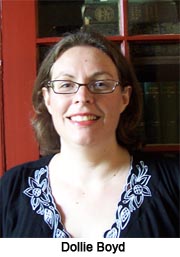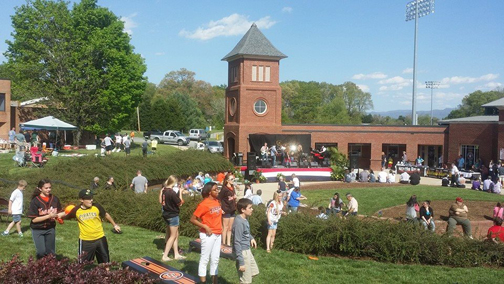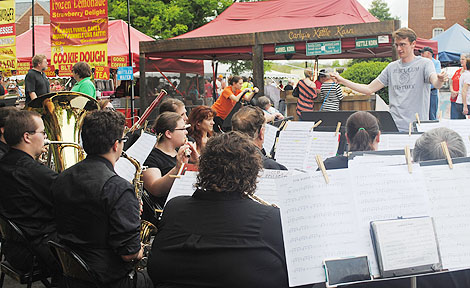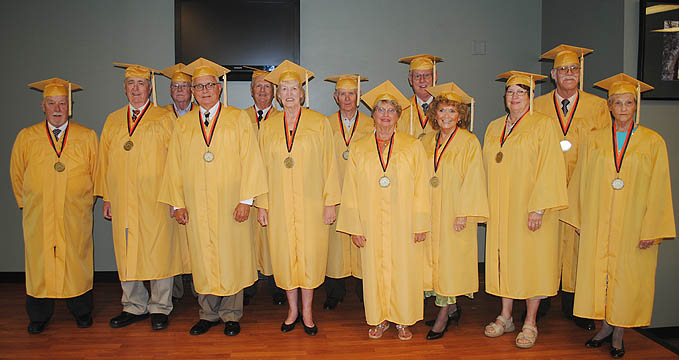Quantum physics, string theory, and geological and astronomical discoveries have all changed the scientific views of the world and universe that man inhabits.
The emerging cultural paradigm that is arising out of those discoveries, its effect on Christianity and how science and the Christian belief system can relate were among the topics explored during the concluding session of the annual Theologian-in-Residence lecture series on April 21 at Tusculum College.
Dr. Jim Miller, president of the Presbyterian Association on Science, Technology and the Christian Faith, has led the series this year. Now in its 25th year, the lecture series is sponsored by Tusculum College and partially funded by Ron Smith.
Currently, there is an emerging cultural paradigm, Dr. Miller noted, in which “things are changing substantially, but the modern world is still with us in the way that people think.” During the modern period, a dualism developed in which science and religion were considered to be separate and it is still prevalent today, he continued.
The emerging worldview also has roots in the classical world in that has an organic characteristic, but it also has its foundations in the writings of Immanuel Kant who asserted that knowledge is not obtained directly but is mediated through something else, said Dr. Miller, who is an ordained Presbyterian minister and currently the co-chair of the Broader Social Impact Committee of the Human Origins Program at the Smithsonian’s National Museum of Natural History.
In the emerging worldview, knowledge comes through personal commitment, he said, in that an individual has to commit to a framework through which he explores the world.
The whole is considered greater than the sum of the parts in the emerging worldview and metaphysics are considered circumstantial, in that one person’s truth is not seen as necessarily being another person’s truth.
Dr. Miller said in current society, Christians need to be wary of the “fallacy of misplaced concreteness. We have a tendency to think of our notion of God as though it is God and our notion of the world as how the world really is.” Scripture is important, he continued, “but we be cautious to not give it a status it does not have. The Bible is not God, but points us toward God.”
If asked, most people would say that science and religion are in conflict in the public realm and on a personal level, most would say they see the two as separate and best if walled off from each other, Dr. Miller said.
However, there is an emerging view that religion and science are mutually compatible – that they are different but can have transformative effect on each other, he continued.
Parallels can be seen between the scientific process and religion, Dr. Miller said. For example, in science, an individual has a theory and then publishes it to the scientific community, which tests the theory and if it passes the test, it is accepted by the community and is incorporated into education.
A parallel process can be seen in religion, such as the Presbyterian process of approving a person for the ministry, he continued. When an individual feels called to ministry, the person takes that personal idea and communicates it to the community. The community takes the person under the care of the Presbytery and then they are examined through their education at seminary. As the person completes seminary, they are examined and accepted into the community if they ware successful with the last step as installation into an office of service.
“Both processes begin with the individual, but ultimately involve the community,” Dr. Miller said. “Science is a communal enterprise and our faith lives are communal.”
Dr. Miller had several recommendations about how the Christian church can respond effectively to new scientific developments. Christians have the same duty as their forefathers to express faith in their world, he said, which is not to say that it will be easier or less of a challenge than those in the past faced.
He recommended that pastors speak of God as creator in present rather than past tense as creation is a continuing process. Dr. Miller said he considers himself a creationist in that he believes the ultimate reason for the creation of the universe is God. “God called the world into being and each being has the freedom to create itself and decide how much it will embody God’s call,” he said.
Rather than ignore science, as the church has done in the past, it is important for Christians to understand basic science and recent discoveries so they can credibly talk with those outside the faith about science, he said, and local churches can help equip their congregations by providing answers to questions they may have about science and religion.
“Congregations can act as ideological sanctuaries where people with differing ideas can engage in civil discourse,” he said. “Churches have historically been safe havens to discuss issues, which is needed into today’s environment.”







 The countdown has begun to the return of the Class of 1965 to the Tusculum College campus to celebrate their 50th reunion.
The countdown has begun to the return of the Class of 1965 to the Tusculum College campus to celebrate their 50th reunion.